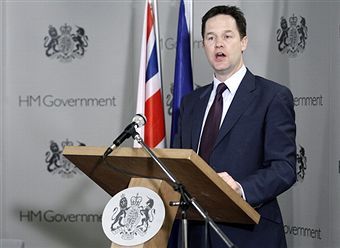 From the moment David Cameron started agitating for a no fly-zone, he’s been looking for
allies. France and Denmark look like they will support him, with Russia and India opposed and China perhaps willing to abstain at the United Nations. But what about closer to home, inside the
coalition?
From the moment David Cameron started agitating for a no fly-zone, he’s been looking for
allies. France and Denmark look like they will support him, with Russia and India opposed and China perhaps willing to abstain at the United Nations. But what about closer to home, inside the
coalition?
Since the formation of the coalition, every policy has been tested by what will it do for relations between the parties? Oddly, however, there has been no such test about Libyan policy. Newspapers have not been writing about splits, differences and agreements. That may be because Lord Ashdown went on the Today Programme and voiced conditional support for a no-fly zone. But the Lib Dem peer has always been a hawk. He supported the Iraq War and rarely backs away from a fight with a dictator if he can have one.
However, the Guardian article by the party’s leading anti-war agitators, former leader Ming Campbell and human rights lawyer Philippe Sands QC, calling for the international community to “establish a no-fly zone” represents a significant shift. It marks the return, as Julian Astle writes over at the Daily Telegraph, of a party of intervention. “Expect”, he writes, “the Lib Dems now to get on the front foot over Libya.”
If they do, it will mark a second return for Nick Clegg. The Lib Dem leader has been oddly absent from the debate, since his misplaced attempt at self-deprecation when he said he “forgot” he was in charge while the Prime Minister was away. The one exception was a worthy speech delivered in Brussels. Clegg’s long-term strategy is to make his party seen as serious, a credible government. But by shunning the most important war-and-peace debate Britain has had since the Iraq War and letting other members, like Paddy Ashdown and Ming Campbell define the party’s policy, the Deputy Prime Minister risks undoing himself.






Comments